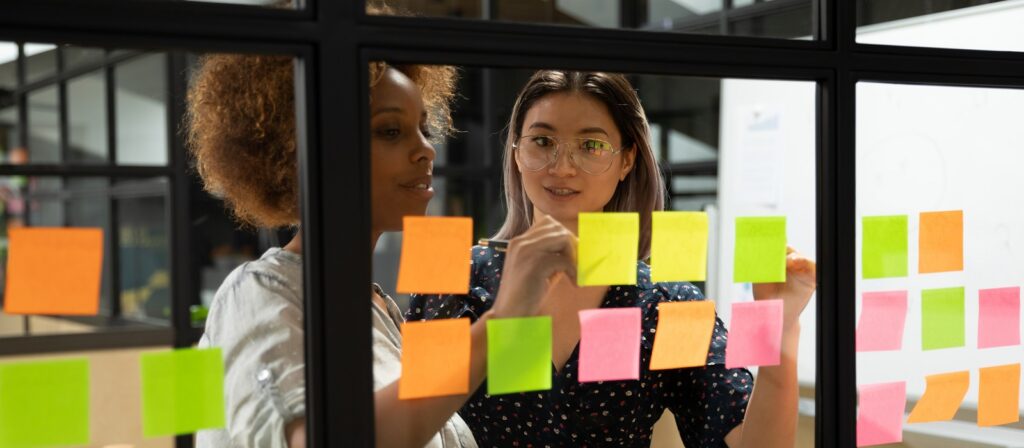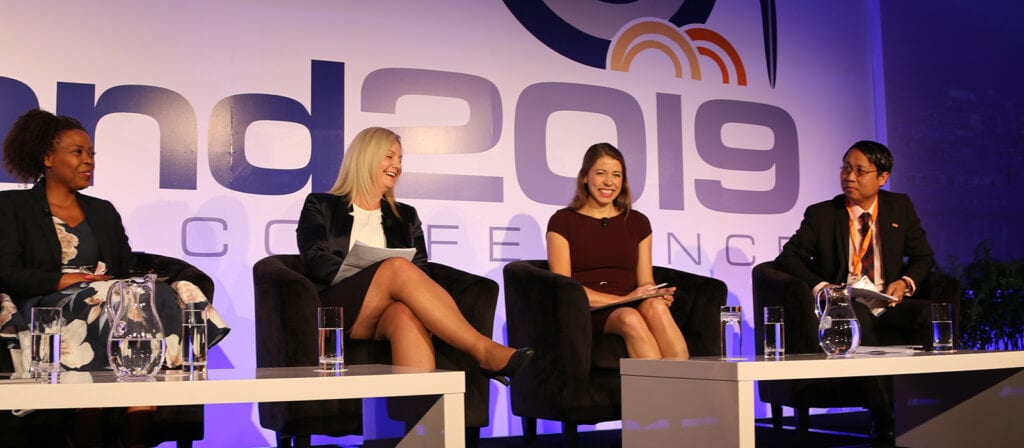As a financial cooperative and socioeconomic leader, Desjardins see diversity as a source of strength. Not only do organisations with a strong diversity, equity and inclusion (DEI) plan outperform their competitors; but by promoting DEI in the workplace, Desjardins believes it can better meet the needs of its members and clients, employees and communities. Positive mental health outcomes are also a welcome benefit of prioritising DEI, and this is now something that employees are looking for in their employers.
Nearly every company has put together a policy on diversity, equity and inclusion (DEI) – but what do these terms really mean? Salwa Salek, Chief Equity, Diversity, and Inclusion officer at Desjardins Group in Canada, believes that it’s about accepting people for who they are and guaranteeing the same treatment for everyone.
“Having DEI in our organisations gives us an opportunity to rebalance and ensure that everyone is treated fairly by addressing barriers and ideologies,” Ms. Salek explains.” As our society becomes more diverse, it ensures that the company is able to tap into all the best talent and perspectives.”
More than just a moral imperative, it’s become clear that organisations with a strong DEI plan outperform their competitors, Ms. Salek adds. These companies report higher revenues, happier and healthier employees, less turnover, increased productivity, greater innovation, and more creativity.
Positive mental health outcomes are also a welcome benefit of prioritising diversity, equity and inclusion, says Charmaine Alexander, a plan sponsor service advisor in disability management and prevention at Desjardins Insurance. Ms. Alexander is also a certified mental health first aid facilitator through the Mental Health Commission of Canada.
“Teams that have a lived experience of DEI understand that their workplace is safe,” says Ms. Alexander. “When they feel that their employer has taken the time to educate people and leaders about diversity, equity and inclusion, employees feel that their individual voices are being heard. Employees want to contribute and be a part of their employer’s success.”
Ignoring diversity, equity and inclusion can have negative ramifications on employee mental health. “If you feel that you aren’t being treated equally, you might hold back,” she says. “You may not feel safe to voice opinions. That has a direct effect on mental health.”
Desjardins Insurance understands that strong mental health supports and DEI initiatives are something that employees are looking for in their employers. “Previously, people were motivated by salary, by title or by position, but that’s not the case anymore, especially through the pandemic,” Ms. Alexander explains.

This article was produced by the Globe Content Studio on behalf of Desjardins Insurance.
Published September 2022
Diversity, equity and inclusion @ Desjardins
At Desjardins, everyone is included, without exception. The company is proud of the way, as an organisation, it reflects its members and clients through its diversity—a fundamental value that enriches society.
As a financial cooperative and socioeconomic leader, Desjardins see diversity as a source of strength, believing differences in gender, ethnicity, culture, religion, age, experience, sexual orientation and physical ability are meant to be celebrated; and these differences makes the organisation stronger. By promoting DEI in the workplace, Desjardins believes it can better meet the needs of its members and clients, employees and communities.
Supporting diverse groups
Visible minorities, cultural communities and Indigenous people
Desjardins strives to represent the communities it serves. That's why it supports initiatives that ensure its workforce is truly diverse. Efforts to promote an inclusive environment include:
- Becoming a signatory to the BlackNorth Initiative.
- Being on the Canadian Board Diversity Council (CBDC).
- Meeting with candidates from immigrant backgrounds through the Interconnection programme.
- Supporting the recruitment, integration and retention of newly arrived skilled workers through the PITF project.
Women
Women are an integral part of Desjardins. Its co-founder, Dorimène Desjardins, played a key role in the success of the cooperative at the turn of the 20th century.
Everyone should have access to opportunities for advancement. Desjardins is committed to increasing the number of women in leadership positions. Currently, 59% of managers are women.
The organisation encourages women to develop their leadership potential and take on more responsibilities at work. Through its women's networking group, Empowering Women, employees and directors can help each other, network and improve their skills.
Youth
Desjardins offers student jobs, part-time positions and paid internships in a variety of fields. Young people can benefit from a stimulating workplace where student schedules are accommodated.
The Young Intern Director program gives 18- to 30-year-olds the chance to sit on a caisse board of directors (without voting rights). The interns get to work alongside board members and build a valuable network of professional contacts to help them further their career.
LGBTQ+ community
Desjardins fosters a healthy, safe and respectful work environment where people of all identities and orientations can be themselves and reach their full potential.
For more than 10 years, its LGBTQ+ committee has been working to make Desjardins a more inclusive workplace by raising awareness and targeting issues that affect staff, members and clients.
Neurodiversity and disability
The company is committed to ensuring everyone can benefit from its services. ATMs, buildings and websites are all accessible.
It has processes and partnerships in place to facilitate the hiring and onboarding of neurodivergent individuals. It works with Action main-d'œuvre Inc., an organisation that provides specialised employment assistance and job retention services to people with autism or intellectual disabilities. It is also a partner of the Conseil québécois des entreprises adaptées, and it collaborates with companies that lead in disability inclusion in the workplace.
Putting DEI plans into place
Ms. Salek says that successful DEI plans start at the top with chief executive officers who include those principles in the organisation’s top priorities. “As much as we have committed to a top-down approach with our DEI goals, we count on every person, at every level, and all those who engage with us, to contribute to this ecosystem,” she says.
Diversity practices aren’t just about hosting a workshop or making some additions to your company policies. They’re about creating a new ecosystem in your organisation. To start, Ms. Salek suggests creating a plan and prioritising it.
“Ensure buy-in from leadership and hold them accountable,” she says. “It is a business concern if we want to hold on to employees in a competitive market where millennials choose their employers based on their values. We won’t be sustainable if we can’t retain them.”
Once plans are put in motion, there should also be a system in place to collect and analyse data. “Listen to your employees to understand what you have and where you need to go,” Ms. Salek says. “That will serve as the measure of your diversity efforts.” She also reminds leaders that DEI must address diversity, equity and inclusion in equal measure. A diverse workforce that is not treated equitably or made to feel included won’t move the needle. “They must all be present with every action taken,” Ms. Salek explains.
Leaders can also look outside their organisation to trusted partners in DEI to help enhance initiatives and offerings. Catalyst, the BlackNorth Initiative and Pride at Work are three great non-profit organisations to engage with, Ms. Salek suggests.
Ms. Alexander adds that DEI and mental health can “no longer be pushed to the background.”
“Employers can’t say ‘we’ll deal with that later’ or ‘we’ll wait until we have more money or resources’ – the pandemic has pushed these issues to the forefront,” explains Alexander. “You can still start introducing DEI practices – even small changes can make an impact.”
Salwa Salek, Chief Equity, Diversity and Inclusion Officer, Desjardins





